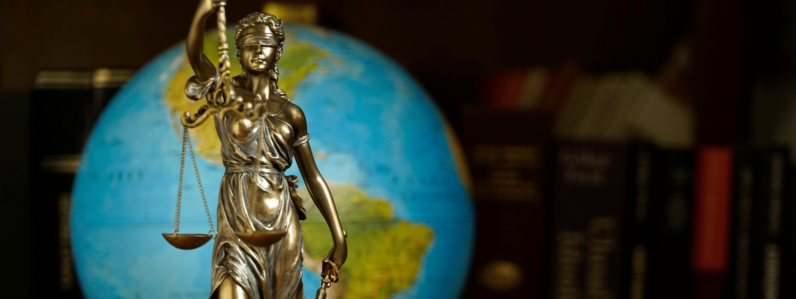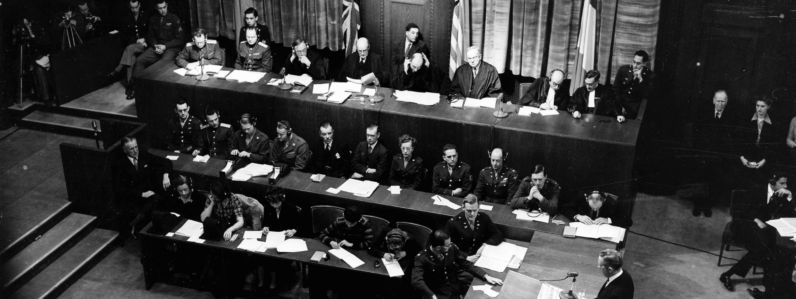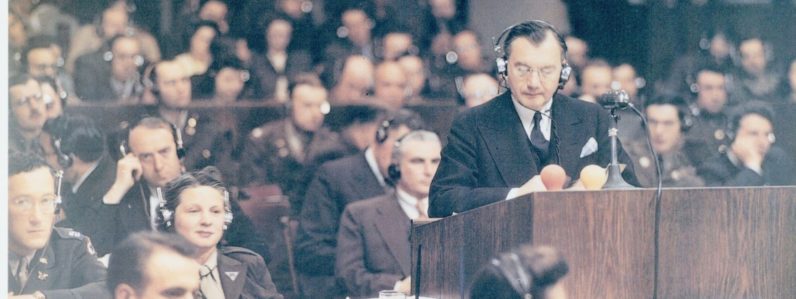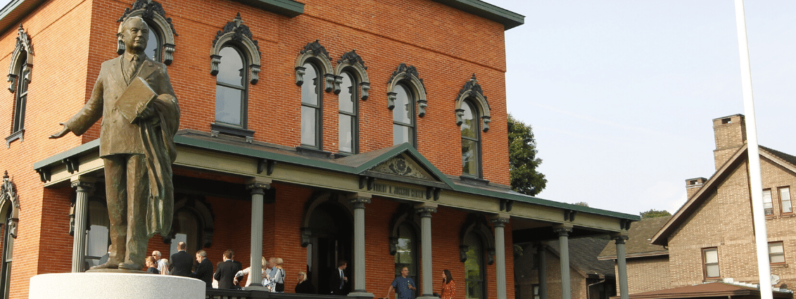It is with diffidence and humility that I greet the ultimate constitutional power in the Republic, the Presidential electors.
Presidential electors belong to a land of constitutional make-believe, rather than to the world of practical politics. At law, it is you only – not the people – who can elect a President. At law you can choose as President any native-born citizen, thirty-five years of age and fourteen years a resident of the United States. Legally, you electors were the only candidates last November. Those presumptuous fellows who were doing all the talking had no legal standing at all, and never could have any except by your leave.
With this vast grant of constitutional power, electors have chosen to become merely the faithful proxies of the people. The last time that an elector broke away and voted for anyone other than his party nominee was way back, I believe before 1800. A disappointed partisan is said to have expressed the sentiment: “I chose him to act, not to think.” His doctrine has now become unwritten law.
Presidential electors are about the only officials known to man who have not magnified their offices and reached for more power than the law gives them. They should be preserved if only for this example of self-denial. But there is another reason for keeping them. The electoral system is the alibi and chief consolation of a defeated candidate. He can enjoy the sensation of being a near-President by contemplating that a shift of a few votes in strategic states would have turned defeat to victory. And the winner can point out that an equally trifling change the other way would have made his election unanimous.
It has never been revealed to me just why the electors collectively have been given the wholly unconstitutional title of “Electoral Colleges.” However uncertain your right to dispense college degrees, I am reliably informed that a large number of freshmen are now preparing for your Class of ’44. They come from Washington, from state Capitols, from prosecutors’ offices and, under recent precedents, you may have a few recruits from Wall Street. Regular Republicans are complaining that if they take the full course and do all their homework, some correspondence school rival may show up for the first time at commencement and try to run away with the college honors. And some Democrats are holding back to find out for sure whether a certain gentleman intends to come back for more post-graduate courses.
As you know, I have had occasion – officially – to look into the cost of the courses in your college. I will say that there is no other college in the country where it costs so much to get a mere “honorable mention.”
The present function of Presidential electors as the people’s proxy is a formal one. But those of 1940 have performed this formal duty with consciousness of its historical significance that is uncommon. You have cast the constitutional ballots which institute the only third term in the nation’s life. The Constitution makes it clear that the President, to borrow the language of Hamilton, “is to be elected for four years; and is to be re-eligible as often as the people of the United States shall think him worthy of their confidence.” However, not half of our Presidents have had a second term, and it has been reserved to you to name as the original third-term President, Franklin Delano Roosevelt.
Tomorrow’s inauguration is significant not merely as a departure from one hundred and fifty years of practice, but chiefly because of the kind of leadership that has won this triple vote of confidence. It is the spiritual quality of President Roosevelt’s aggressive conviction that democracy is sound and is to survive that earns for him the instinctive support of masses of men. In troubled times they do not profess to know what is wise, but they do know what is right. It is his ability to interpret what is in the hearts of his fellow-men which invests the President’s leadership with its moral authority. The most secularly minded among us will acknowledge, even if only in deference to the somber prospect ahead, that no generation ever had a greater need for faith – for fighting faith – in a moral order in the universe.
In these times when all democracy is on trial, it is a welcome sign of your faith and courage that the subject which is assigned to me is “A Progressive Democracy.” That is not a defensive title, and it has no defeatist note in it. It rings with hope and challenge. It is only a progressive democracy that can withstand the pressure of the anti-democratic forces which are making a drive for a “new social order” in the world. Hitlerism in fact derives its greatest incentive and consolation from a belief that our democracy has become stagnant, decayed, and degenerated into what Hitler calls a “plutocracy of the money bags.” It is on such assumptions that he wars on democracy and promises what he asserts is a better way of life. It is not easy to translate these abstract generalities into terms that admit of a genuine comparison with our own democratic achievements.
It would help our understanding if every discussion of revolutionary aims – Nazi, Fascist, or Communist – were always brought out of the clouds and down to earth, out of generalities and down to specific things. In that way we clearly see that those who aim at progress by revolution have nothing to offer to us, whose institutions permit and encourage progress by reasoned steps and by democratic processes.
I was interested recently in an effort of leading legal minds to clarify the revolutionary aims of Nazism and Fascism. According to dispatches, Dr. Hans Frank, the Nazi Commissar of Justice, and Count Grandi, Italy’s Minister of Justice, jointly addressed the foreign press in Berlin. They assured listeners that their political creed would spread to other countries and would spell happiness. The creed, agreed these lawyers, was “that the French Revolution which has been fought for the rights of the individual was being replaced by their revolution by which the rights of the community supersede those of the individual.”
So this is the “new order” for which Europe is drenched in blood.
Nothing better demonstrates the difference between the methods of the Axis leaders and our own way of doing things than this statement. Assuming their good faith in saying that a re-assertion of the rights of the community is the purpose of their revolution, we may justly reply that we in this country are successfully reasserting the rights of the community without resort to revolution. It is probably true that our own tendency during the nineteenth century was too far in the direction of an irresponsible individualism. Exploitation of manpower and of resources, reckless speculation by a few at the expense of the commonwealth, and ruthless amassing of great fortunes was the order of the day and wrote its own queer code of morals into our law, quite as definitely as it did in that of Germany, Italy, or any other country.
Every person who knows the trend and direction of American jurisprudence knows that peacefully and by democratic control our whole society has for some years been solving the problem of better protection of the community against individual anti-social action. Cities and towns have adopted zoning ordinances, vocational and health regulations. State governments have established regulation of public utility rates and practices and control of many enterprises that bear on the public interest. The federal government, too, has taken up regulation of rates and practices of railroads, stockyards, interstate utilities and holding companies, security issues, and a score of other subjects, each designed to protect the community against ruthless exploitation.
We have spilled tons of printers’ ink on these things, but no blood. A progressive democracy had tackled and at least partially solved this problem long before Hitler began to destroy the peace of the world.
Still hoping to have the aims of the communist-fascist revolution brought down to terms of every day life, I read with unusual avidity a dispatch from Berlin, which told of the year-end address to German workers by Dr. Robert Ley, Chief of the Nazi labor front. In it he promised the laborers that they will “have it better after victory” when “the Moloch of world capitalism” has been destroyed. Since this threatened to be a hard world for everybody except workingmen, I looked anxiously to see what all of the blood-spilling of revolution really promised the workers. This is what Dr. Ley said:
“Reasonable old-age pensions, generous health programs, a single free time vacation program, just wages, training in a profession, and social residence construction of unheard of proportions – all this will be your victory counsel and guarantee.”
To those of us who are interested in a progressive democracy it is significant that there is not one item of this Nazi promise to German workers that this country has not already begun for American workers. Some of these measures need extension and improvement, but the point is that processes of democracy are bringing them here to American workers sooner than marching armies can bring them to German workers.
We of the democracies of the earth can stand forth and say that no nation by violence, by confiscation, by dictatorship has ever yet attained such standards of living, such economic security or social justice as we have done by democratic processes, guided by free public opinion. The record on this continent is one of steady, orderly progress. The claim of the dictator propagandists that the powerful never concede anything and the humble never win anything under democracy is a falsehood by the record.
Even we Americans are too often forgetful of the strides made on our soil, in a stumbling way, perhaps, but with a sure direction toward a more just order. In our early days the fight was made and peacefully won to abolish the law of primogeniture by which all property descended to the first-born male. Then our constitutional Bill of Rights summed up and established the most advanced doctrines of human liberty of the eighteenth century. But we did not stop. We moved on to abolish imprisonment for debt – which reform many said would undermine the whole structure of property, but it didn’t. Then we gradually abolished property qualifications for voting and for holding office and extended the franchise to women. We moved into the field of free education for classes to whom it had never before been available and adopted compensation for industrial accidents and regulation of property used in utility services. Now, under the administration of President Roosevelt, we have brought to reality plans for compensation during forced unemployment, support for dependent old age, wider programs of training for youth, vast projects for new housing, for betterment of farm opportunity, for protection of labor by real collective bargaining, and for higher standards of living and protection against depression.
Of course progress is slow. Of course it is accompanied by what at times seems an unnecessary amount of strife and resistance. But the strife under our system is one of conflicting arguments, not conflicting armies; its weapons are reason, not force. And no regime of dictators or monarchs can show so long, so consistent, or so successful a record of gains by the humble and concessions by the powerful as our democratic system has accomplished in peace and order.
It is not wise so to overstate our case for democracy as to discredit it. We have not, of course, nor has any other nation or system, eliminated all injustice, oppression, and discrimination. We have not yet brought to the individual the degree of security and plenty that science and technology make possible. We have not yet full protection against the cycles and caprices of our economic system.
As you know, I have never hesitated to criticize our existing laws and practice or to strive for their modernization and improvement. I believe in reforming to save. Wise repairs are necessary to protect our structure. But let us not in our criticism overlook the fact that nowhere in the world can comparable opportunity for men be found nor comparable dignity and power in citizenship be seen. When we look at what others have accomplished we may feel our own country to be quite exemplary. It is only when we compare our existing situation with our boundless possibilities, that we are critical.
Progressive democracy is the genius of our people. We have become both great and free by holding both to liberty and to order. We cannot retreat if we would. The instinct that submits its grievances and hopes to public opinion, the sportsmanship that accepts the results of elections is bred in our blood and bone. No course in our opinion is more fatal for any cause than to resort to violence, to excessive pressures, or to means outside the law. I know of no shorter path to oblivion for any American than even to hesitate in his acceptance of a verdict of the people. In these things is our greatness, our security, and our peace.
If Fascism were for others an efficient, powerful type of social organization, it would not do for us because it is not our genius to be Fascist. If Nazism were a really new and superior political technique, we could not use it for it is alien to our instincts. If Communism were a just and equitable system, we could not operate under it, for to create, to keep, and to own property is as much a part of our culture as to speak freely.
So, tonight I toast “A Progressive Democracy,” not in a partisan sense, though I am proud that my party and the party of my fathers has contributed more to it than any other. I toast a progressive democracy rather as the genius and achievement of our people. It is not perfection and it has not brought perfection. Indeed, that ideal will probably always retreat as we approach it. I toast democracy not alone for what it is, but chiefly for what it may become; not merely for what it has done, but also for what it makes possible for us and our children to do. Its road to the future leads through discussion, reasoning, persuasion, experiment, trial and error. Progressive democracy does not lead through violence, revolts, or armed coercion. It leaves our destiny with no limitations except those which our own minds impose and no pitfalls except those that might be dug by a failing faith.
It is our heritage and our hope - and we mean to keep it.






